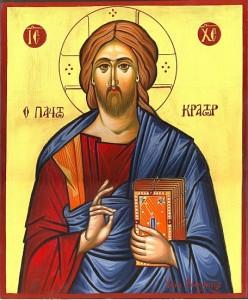Thoughts on Today’s Lessons for Oct. 26, 2014
First Reading: Deuteronomy 34:1-12Here ends the Torah, the first five books of the First Testament, the Law. Moses has led the progeny of Abraham, Isaac, Jacob and Joseph out of slavery in Egypt, received God’s commandments and made God’s covenant at Mount Sinai. He has wandered 40 years in the desert with a fractious people, and now comes within sight of the Promised Land only to meet God again, on another mountain top, and learn that he may see the land but that he won’t be allowed to cross over to it. Moses sees God’s promise fulfilled, but Moses will not live to enjoy it.
First Reading (Track 2): Leviticus 19:1-2, 15-18
The central law that we love our neighbors as ourselves frames today’s readings, beginning with this encounter between God and Moses and returning in Jesus’ words in the Gospel. In a series of instructions that restate the moral code of the commandments, God’s words to Moses in this reading tell us how to be in good relationship with our neighbors. They culminate with the summary conclusion – the first place in the bible where this is explicitly stated as a rule – that we shall love our neighbor as we love ourself.
Psalm: Psalm 90:1-6, 13-17
This Psalm, attributed by tradition to Moses, sings praise for God’s eternal ongoing creation in which a thousand years pass like a day. In comparison, our lives are as evanescent as the grass that turns from green to brown overnight. Then the narrative turns to a plea as we ask God to hear our prayers, to turn toward us with loving-kindness and make us glad.
Psalm (Track 2): Psalm 1
Today’s short Psalm, the first in the book of Psalms, sings of the two paths that we may choose to take through life. In poetic verses that seem to foreshadow Jesus’ parables about the seeds that fall on variously nourishing ground, the Psalmist likens us to trees: The lush, fruitful and well-watered trees of the righteous who follow God’s way; and the weak trees that can’t stand straight, representing the way of the wicked. Which way shall we choose? The Psalm makes our options clear.
Second Reading: 1 Thessalonians 2:1-8
It is interesting to “listen in” as Paul talks about one of his churches in Greece to the people of another neighboring church! The Philippians apparently had some big problems; someone there clearly didn’t treat Paul well. The people of Thessalonika, though, treated him kindly, developing a dear friendship that Paul likens to a nurse caring for her children. (Happily, by the time Paul wrote his letter to the Philippians several years later, all must have been forgiven, as it reflects a cordial relationship too.)
Gospel: Matthew 22:34-46
We may think of Jesus’ words about the greatest commandment as profoundly Christian, deeply reflecting everything we know about Jesus. And this is true. But we should never forget that these words are deeply Jewish too. The “greatest and first” commandment, by Jesus’ own statement, directly quotes the Shema, the most important Jewish prayer; the second comes straight from the Holiness Code in Leviticus. Our spiritual heritage goes back a long way, and as Jesus told us earlier in Matthew, he did not come to abolish the Law and the Prophets (that is, the first testament) but to fulfill it.

